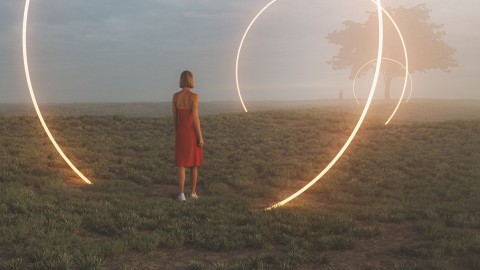The primitive societies live in the psychological time. The East has lived in the psychological time; the West lives in the chronological time. If you move farther into the primitive societies hidden behind the hills and the forests, deep, you will see they live absolutely in psychological time. There are a few primitive societies in which dream is more important than reality, and the first thing a child has to do before breakfast is to relate his dream to his elders. The first thing is psychoanalysis. The dream has to be related to the elders before breakfast, and they all gather together and they analyze the dream. And then they tell the child to do something, because the dream is symbolic and it shows that something needs to be done.
For example, a child dreams that he has been fighting with a friend, and in the morning he tells the dream to his elders. They will interpret it, and they will send the child with gifts and sweets and toys to the other’s house, to the other child, to give him presents, and to tell him his dream. Because he has committed a crime.
In the West you cannot conceive of it. What have you done? You have not done anything, you have simply dreamt, but that particular primitive society says that you dreamt it because you wanted to do something like that, otherwise why? It must be a desire, hidden, repressed. As far as your mind is concerned, you have committed it. Go and tell the child so no subtle anger goes on surrounding you. Tell the whole thing and ask his forgiveness and present these gifts to him.
Real gifts for a dream fight… but a miracle has happened to that society. By and by as the child grows, he stops dreaming. Dreams disappear. A grown-up man is one, according to that primitive society, who does not dream. This seems to be beautiful. Of course that society will not be appreciated by psychoanalysts because their whole profession will be gone.
The young girl went to see her psychiatrist and he asked her what she had dreamt the previous night. She told him that she had not had any dreams at all that night, whereupon he got very angry and said, “Look, if you don’t do your homework how can I help you?”
Dreaming is homework; and a psychoanalyst lives off your dreams. He goes on analyzing them. But this is something absurd. You cannot analyze your own dreams; how can somebody else do it? Because psychological time is personal, nobody can understand more than you yourself. Your dreams, how can somebody else understand them? His interpretations are going to be falsifications. His interpretations are going to be his interpretations. When a Freud analyzes your dream, his interpretation will be different.
When Jung analyzes the same dream, his interpretation is different. When Adler analyzes the same dream, his interpretation is different. So what has to be thought about it? You have dreamt one dream and three great psychoanalysts interpret it in three different ways.
Freud reduces everything to sex. Whatsoever you dream makes no difference. He will find a way and reduce it to sex. It seems he was obsessed with sex. He was a great pioneer, he has opened a great door, but he was phobic and he was afraid of sex; and he was afraid of other things also. He was so phobic that he could not cross the road; that was one of his great fears. Now you cannot think of Buddha being afraid of crossing a road. This man himself is ill. He was so afraid of talking with people, that’s why he created psychoanalysis. In psychoanalysis the psychoanalyst sits behind a screen and the patient lies down on a couch and goes on talking and the psychoanalyst simply listens – no communication. He was afraid to communicate. In personal encounters, person to person, he was always awkward. Now his whole mind has entered into his interpretation.
That’s natural, that’s how it should be.
Jung brings everything to religion, everything. Whatsoever you dream he will interpret in such a way that it becomes a religious dream. The same dream becomes sexual with Freud; with Jung it becomes religious. With Adler it becomes politics. Everything is ambition, and everybody is suffering with an inferiority complex, and everybody is trying to gain more power – “will to power.” And now there are a thousand and one psychoanalysts all over the world, of different denominations. The denominations are as many as in Christianity. So many schools, and every psychoanalyst starts his own school.
And nobody is bothered with the patient, that – it is his dream.
The problems of the psychoanalysts enter into their analysis, interpretation. This is not a way to help. In fact it is going to make things more complicated. A better society will teach you how to analyze your own dreams, how to psychoanalyze your own dreams.
Nobody can be more certain than you because nobody can be closer, only you.
The beautiful young lady went to see a psychiatrist. The doctor looked at her for a few seconds and then said, “Come over here, please.” He then promptly put his arms around her and kissed her. As he finally released her, he commented casually, “That takes care of my problem. Now what is yours?”
They have their problems. They have their minds, obsessions.
In the East there has never existed anything like a psychoanalyst. Not that we were not aware of the psychological world. We were aware more deeply than any society has ever been aware, but we created a totally different type of person to help. We call that person the guru, the Master. What is the difference between a guru and a psychoanalyst? The difference is that the psychoanalyst still has his problems, unsolved, and the guru has no problems. When you don’t have any problems, then your vision is clear. Then you can put yourself in the other’s situation. When you don’t have any problems, any obsessions, any complexes, nothing – you are completely clean of the mind, the mind has disappeared and you have attained to no-mind – then, then you can see. Then you will not interpret in a personal way. Your interpretation will be universal, and will become existential.
And the third is real time, existential. The real time is no time at all, because the real time is eternity. Let me explain it to you.
The chronological time is arbitrary. In the West Zeno proved it long before. In the East Nagarjuna proved it so deeply that he has never been refuted. In fact Zeno and Nagarjuna, two persons, have remained irrefutable. Nobody can refute them; their arguments are so deep and absolute. Zeno and Nagarjuna say that the whole concept of time, chronological time, is absurd. Let me tell you a few things about these two persons and their analysis of chronological time.
They achieved the highest peak of time analysis. Nobody has ever been able to surpass them or improve upon them. They say, “What is time?” You say, “It is a process. One moment moves into the past, disappears; another moment moves from the future into the present; remains there on the threshold for a time; then again moves into the past, disappears.” This is the time process. You have only one moment at one time, never two moments together. Past, future, and just between the two, the threshold, the present.
Now Nagarjuna and Zeno say, “Where does the moment come from? Is the future already existent? If it is not existent, then how can the moment come out of the non existential?”
Now they create trouble. They say, “Where does the present moment move to in the past? Does it still remain accumulated in the past?” If you say it still remains in the past, then it has not become past yet. If you say it was there in the future and just now it has been revealed to us, it has always been there in the future; then, Nagarjuna and Zeno say, then you cannot call it the future; it has always been present. If the future is, then the future is not; because the future means that which is not yet. If the past is, then the past is not; because the past means that which has gone out of existence.
So whatsoever alternative you choose…. If you say the future is not and suddenly out of the blue the present moment appears, they both laugh. They say, “You are talking nonsense. How out of nonexistence can existence come? And how can the existential move into nonexistence again?” They say, “If there is nonexistence on both sides, then just in the middle, how can existence be? It must also be non existential. You got deceived.”
Then they say, “You take time as a process? You say one moment is joined with another?” Nagarjuna and Zeno ask you, “There are two moments; how are they related? Is there a third moment between the two which relates to them?” Again they create a difficulty because, to relate, a link is needed. To relate two things, to relate the past with the present and the present with the future, links are needed. Then where do those links exist? What are those links? They can only be of time. So between one moment and another there is another moment to join these two. So instead of two there are three, but again they will have to be joined. Infinite regress arises.
Look at your two fingers. These two are needed to be joined; they become three fingers.
Now there are two holes instead of one, two blanks. They have to be joined; they become five. Now there are more gaps to be joined, and so on, so forth.
The chronological time, Nagarjuna and Zeno say, is utilitarian. It is not substantial. Real time is not a process, because, Nagarjuna says, if time itself is a process, then it will need another time. For example, you walk. You need time. You have come to the office, from your home. It took fifteen minutes for you to come to the office. If there is no time, how will you come to the office, because walking needs time? Walking is a process; you need time. All processes need time. Now Nagarjuna says, “If you say time itself is a process, it will need another time, a supertime. And that too is a process. Then a super-supertime….” Again infinite regress arises. Then you cannot solve it.
No, time – real time – is not a process. It is a simultaneity. Future, past, present are not three separate things; so there is no need to join them. It is eternal now, it is eternity. It is not that time is passing by, by your side. Where will it go? It will need another medium to pass through, and where will it go and from where will it come? It is there; or rather it is here. Time is. It is not a process.
Because we cannot see the total time – our eyes are confined, limited; we are looking out of small slits – that’s why it seems you can see only one moment at a time. It is your limitation, not a division of time. Because you cannot see the whole time as it is – because you are not whole yet – that’s why.
Tags: Patanjali Real Time Is A Simultaneity










